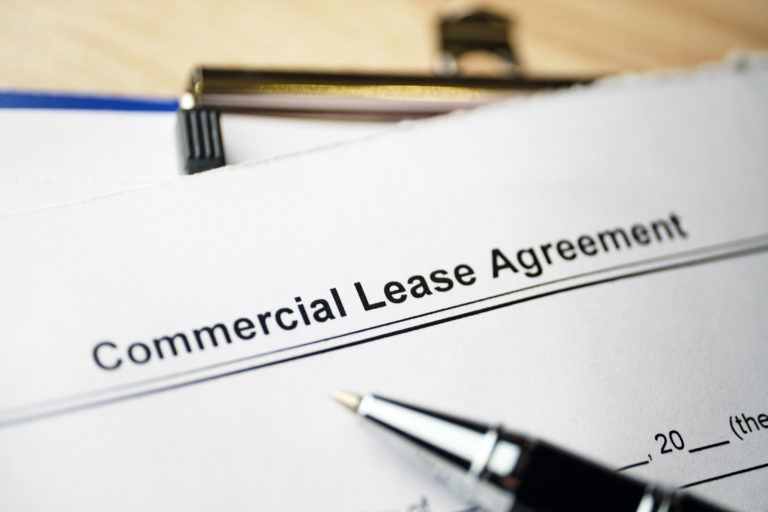
Tips on Avoiding the Pitfalls of Commercial Leasing
by Bruce Tannas
For many small businesses, their commercial lease is the second biggest reoccurring expense after employees. Yet there are many business owners who don’t know that they can and should negotiate their lease price and terms. While most landlords are used to negotiating leases, most small business owners are not. That is why you should seek professional help from a lawyer that is knowledgeable in commercial leasing as well as help from others such as a commercial real estate agent. This article will help you prepare for negotiating a commercial lease by giving you some tips to help you avoid the pitfalls of business leasing.
Understanding the Types of Leases
For most commercial leases, rent is based on a price per square foot. That cost may or may not include common costs, maintenance, utilities, and business and property taxes. Different types of commercial leases have different costs and responsibilities. According to an article by BDC, these are the most common types of commercial leases in Canada:
- Gross Rent Lease: You pay a single amount to the landlord that covers base rent and all incidentals. Those typically include utilities, property tax, insurance, maintenance, repairs, and common area expenses such as snow removal, janitorial services, landscaping, grass cutting and property management. Another option is a modified gross lease, in which you and the landlord share some combination of incidental costs.
- Net Lease: You usually pay for the base rent plus one of the following: property taxes (most common), insurance or utilities. Your landlord pays for all other expenses.
- Double Net Lease: You pay base rent plus property taxes and insurance.
- Triple Net lease: you usually pay base rent, plus property taxes, building insurance and utilities, as well as other operating and maintenance costs.
- Percentage Rent Lease: You pay a base rent plus a percentage of your gross sales over a certain minimum. These are usually used in malls and other multi-tenant retail locations.
It is important to understand what type of lease you are negotiating so you understand which costs may of may not be included.
Set a Budget for Your Space Needs
You should set your budget for the business space you need early in the process. For most businesses you should budget for less than 20% of your gross income with 10% of gross being a more manageable amount for most small businesses. The percentage varies as different industries will have different standards so you may want to research what is considered best practice for your industry. Some industry associations can provide best practice benchmarks on cost percentages. Alternatively, you can create an industry benchmarking report from Statistics Canada which will show you what the average costs, including rent, are in your industry.
When you are setting your budget for space, don’t forget to include occupancy costs such as common costs, utilities, business tax, and land taxes as they may or may not be included in the lease (depending on the lease type – see above explanation). This is important because when you consider both the lease costs and the occupancy costs in your budget, you are less likely to negotiate a rent that you can’t afford.
Negotiating the Price
As with all negotiations, you will be in a stronger position if you have more than one option. If you can find two locations that would be acceptable, you are more likely to be in a stronger position as you will be able to walk away if the landlord is not willing to provide you with a fair deal.
Before you negotiate the rent on your preferred space, you need to find out what similar spaces in the area are leasing for. This is where a commercial agent can help you by doing a search of recent listings in the area to see how the advertised cost of this space compares to other similar spaces recently on the market. Keep in mind that the asking cost is the highest that the landlord would get and likely they are expecting less than what they advertised.
Negotiating a business lease contract is often the art of give and take with neither side getting everything they want but hopefully each side gets what they need to complete the deal. Having said that, there are few negotiation best practices to help you get what you need. According to an article in Forbes, one best practice is to start with your target price in mind. Another negotiation tactic is to ask for more than you want at first and when you need to counteroffer don’t counter to low. This is because, to come to an agreement, both sides will have to give some with the tendency to meet somewhere in the middle. If you ask more to start with and counter higher, then the middle amount will be higher then if you had asked less (this is called the anchoring effect).
Aside from negotiating the cost of the rent, you should ask for free rent at the beginning of the lease contract. A free period of 3 to 6 months (sometimes called a fixturing period) is often expected in order to complete the improvements but may only be given if asked for.
Negotiating the Lease Term
Once you have negotiated the cost of the commercial space for rent the next thing you need to consider is the length of the lease. Most leases include a defined term of months or years and can include the option to renew for an additional period.
If you have a newer business, you may want to consider negotiating a shorter initial term of the lease with an option to renew for longer period. This is because you may find that the business concept doesn’t work, or the space isn’t right for your business. So, negotiating a shorter initial lease term with a renewal clause will allow you to keep your options open. Just keep in mind that you may only be able to finance any improvements over the length of the lease. So, the term of the lease you negotiate may be dependent on that and therefore you may need to balance flexibility with the ability to finance lease improvements.
For more mature businesses, you may want to consider a longer lease term. This is because, for many commercial leases, the end of the lease term and subsequent renewal of the lease usually includes a renegotiation of the lease costs. It may be worth while to consider a longer lease term to lock in the commercial lease cost and increase the predictability of this business cost.
Other Lease Clauses to Negotiate
In Canada, for commercial leases, there is no specific legislation limiting the rights of the landlord as there is with residential leases. The assumption is that this is a business deal like any other and the parties are free to negotiate all the terms of a commercial lease contract. Therefore, you would be well advised to review the commercial lease your landlord provides with your lawyer and ensure that you are satisfied with all the terms in the lease. You should also realize that the lease has been written by the landlord’s lawyer and it favors the landlord’s interests. So, it falls on you to negotiate the inclusion of clauses you want and/or request clauses to be changed or deleted. Below are a few common clauses that you may want to consider negotiating (not an exhaustive list):
Personal Guarantee
Some landlords want you to personally guarantee the rent and costs of the landlord associated with the lease. Obviously, if you can avoid giving a personal guarantee then you should. If not, try to limit the personal guarantee in terms of the amount of time it will apply for and the dollar amount that you are personally guaranteeing.
Parachute Clause
You may want to negotiate a parachute clause that allows you to break the lease early. Often these clauses require you giving some notice and then pay a penalty in exchange for the landlord allowing you to break the lease early.
Co-tenancy
If you are moving into a space because of key business(es) in the building, you will want to consider having a Co-tenancy clause. This clause protects you if the major tenant moves out by lowering your rent and/or allowing you to break the lease as a result.
Competitor Clause
If you don’t wish to allow a competitor (either direct or indirect) to move into the building, you will want to negotiate a competitor clause that prohibits the landlord from having competing businesses in the building.
Sublease and Assignment of Lease
To allow you the maximum flexibility, you should consider having a sublease and an assignment of lease clauses.
The sublease clause allows you to sublease the space in case you want to move out or don’t need as much space as you first thought.
If you want the ability to transfer the lease to a new owner of your business, then you should have an assignment of lease clause in your business lease. The assignment of lease clause allows you to assign the lease the lease to someone new.
In either case, the landlord may want to approve who you assign or sublease the space to. While this is a reasonable request, you will need to be careful that the clause limits their ability to object to specific reasonable grounds such as the new tenant has poor credit, poor reputation, the business conflicts with other tenants, etc.
Dispute Resolution:
Ultimately disputes can be decided in court, but that process is expensive and somewhat risky. It is your interest to ensure that there is a fair and independent dispute resolution mechanism, such as a arbitration clause, in place in case you have an issue with the landlord.
Negotiating a lease for your business can be a complex and time-consuming undertaking. But because your commercial space lease is a major business cost, it is worth the effort to do it right. Start by taking the time to do some research into the market and setting a budget for you space cost. Then make sure you learn more about commercial leases before you begin to negotiate one. Finally, you should seek the help of an experienced commercial lawyer and real estate agent or lease negotiator to advise you so you can negotiate the best lease possible for your business.
View the commercial real estate listings on Connect4Commerce.
Connect4Commerce offers entrepreneurs and small business owners across the country a convenient and comprehensive place to connect, exchange goods and services, and advance their businesses. Be sure to check out further articles in our Small Business News blog for additional resources. Also, find professionals on our site that can help you build your business. when you’re ready to find the perfect space for your business you can find the commercial listings on our website.


